The global group live concert market is projected to reach USD 27.4 billion by 2035, reflecting an absolute increase of USD 14.8 billion over the forecast period. The market, valued at USD 12.6 billion in 2025, is expected to grow at a robust CAGR of 8.1%. This growth is primarily driven by the increasing popularity of live music events, the growing demand for immersive concert experiences, and the rising consumer spending on entertainment.
Group live concerts, which feature performances by multiple artists or bands, have become a significant segment in the live entertainment industry. The demand for such events is rising due to the growing preference for experiences over physical goods, especially among younger demographics. Music fans are increasingly seeking live concert experiences as a form of social engagement, entertainment, and connection with their favorite artists. As a result, event organizers are focusing on creating larger, more diverse, and more immersive concert experiences to attract larger audiences.
Advancements in technology, such as augmented reality (AR), virtual reality (VR), and enhanced sound and lighting systems, are further elevating the concert experience and driving market growth. These technologies allow for more engaging and interactive performances, creating unique and memorable experiences for attendees. The continued growth of digital platforms, social media, and live streaming services has also helped to boost visibility for concerts and increase fan engagement, further fueling the market's expansion.
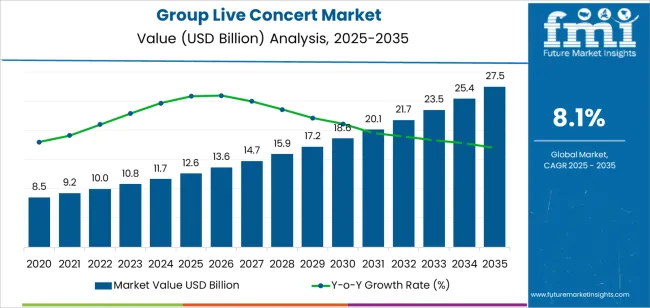
Between 2025 and 2030, the group live concert market is projected to grow from USD 12.6 billion to approximately USD 18.4 billion, adding USD 5.8 billion, which accounts for about 39.2% of the total forecasted growth for the decade. This period will be characterized by a surge in consumer spending on live events, expanding global interest in music festivals, and increasing investment in concert production technologies.
From 2030 to 2035, the market is expected to expand from approximately USD 18.4 billion to USD 27.4 billion, adding USD 9.0 billion, which constitutes about 60.8% of the overall growth. This phase will see further growth driven by the global expansion of live concert tours, the rising popularity of international music festivals, and continued innovation in concert experiences, such as virtual or hybrid concerts, which will appeal to a wider audience.
| Metric | Value |
|---|---|
| Market Value (2025) | USD 12.6 billion |
| Market Forecast Value (2035) | USD 27.4 billion |
| Forecast CAGR (2025-2035) | 8.1% |
The group live concert market is experiencing significant growth driven by the increasing popularity of live music events and the growing demand for in-person experiences. Group live concerts, where multiple artists or bands perform together, offer fans a unique experience and create opportunities for diverse musical genres to attract large audiences. As live performances become a central part of the music industry, more artists and event organizers are focusing on delivering exceptional live concert experiences to meet the rising expectations of fans.
The growth in disposable income, especially in emerging economies, is also contributing to the market's expansion. As more people attend live concerts for entertainment, tourism, and cultural experiences, the demand for group live concerts continues to rise. The increasing role of social media and digital platforms in promoting live events has helped boost awareness, attracting larger crowds and increasing ticket sales for group performances.
Advancements in technology, such as high-quality sound systems, lighting, and virtual reality experiences, have also enhanced the appeal of live concerts, making them more immersive and enjoyable for attendees. Despite challenges like the impact of global events (e.g., pandemics) on large gatherings, the overall market for group live concerts is expected to grow as live music becomes an even more integral part of entertainment culture worldwide.
The market is segmented by type, application, and region. By type, the market is divided into arena/stadium concerts, club/small venue concerts, festival performances, and others, with arena/stadium concerts leading the market. Based on application, the market is categorized into the entertainment industry, public welfare industry, and others, with the entertainment industry representing the largest segment in terms of market share. Regionally, the market is divided into North America, Europe, Asia Pacific, and other key regions.
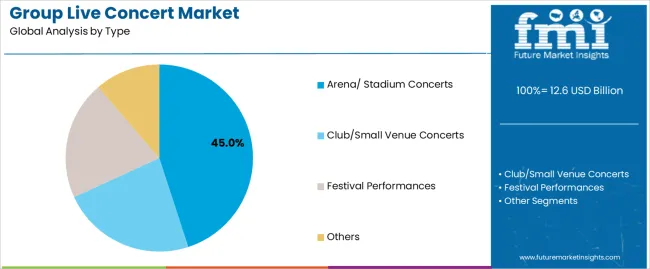
The arena/stadium concerts segment leads the group live concert market, accounting for 45% of the total market share. This is primarily driven by the high demand for large-scale performances that attract thousands of attendees. Arena and stadium concerts offer an unparalleled experience with state-of-the-art sound systems, massive stages, and high-profile artists, making them highly popular in the entertainment sector. The ability to accommodate large audiences and provide extensive exposure for performers makes these concerts a top choice for major live events and tours.
As global demand for live music events grows, especially in large metropolitan areas, the need for venues that can host such high-capacity events is increasing. Arena and stadium concerts also benefit from high ticket prices, sponsorships, and merchandise sales, making them financially lucrative for organizers. This economic advantage, combined with the ever-growing audience interest in large-scale events, ensures that the arena/stadium concert segment will continue to dominate the market.
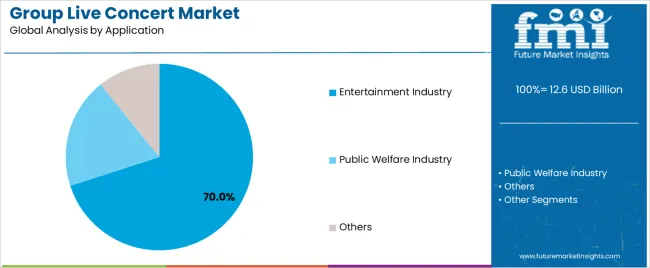
The entertainment industry application dominates the group live concert market, holding 70% of the total market share. This growth is largely fueled by the increasing demand for live performances as a form of entertainment across the globe. Concerts, particularly group live events, are central to the entertainment industry, drawing millions of fans to experience live music, performances, and immersive events. The entertainment industry thrives on the cultural and economic impact of large concerts, festivals, and performances, driving demand for high-quality, engaging live events.
As more artists tour globally and the popularity of live performances increases, concert promoters and event organizers are investing in larger and more sophisticated concert experiences. Advancements in event production and technology, such as augmented reality and virtual concerts, are enhancing the live concert experience. This continued innovation, combined with growing audience engagement, ensures that the entertainment sector remains the primary driver of market growth for group live concerts.
Group Live events offer immersive experiences with high production values that cater to fan demand for shared live‑music atmospheres. Key drivers include rising consumer willingness to spend on live experiences, growth in global touring and strong post‑pandemic rebound in live‑music attendance. Restraints stem from high event‑production and touring logistics costs, dependence on major headline acts, and venue or regulatory constraints.
Why are Group Live Concerts Gaining Popularity Among Music Fans and Promoters?
Group live concerts are gaining popularity because they offer fans a collective, high‑energy experience that can’t be fully replicated via streaming or recordings. For promoters, touring multiple artists together or featuring high‑profile groups helps maximise ticket demand, sponsorship revenue, and venue utilisation. As social sharing and experiential consumption become more important, concerts with large groups-bands or multi‑act line‑ups-appeal especially to younger demographics seeking memorable outings. Promoters are tapping into new markets globally, bringing live concert energy to cities previously underserved, which expands fan‑base reach and revenue potential.
How Are Technological and Production Innovations Driving Growth in This Segment?
Technological and production innovations are fuelling growth in the group live concert segment by enhancing audience experience and operational efficiency. Innovations include immersive stage designs, large‑scale LED backdrops, augmented reality/virtual‑reality integrations, and high‑fidelity sound systems that elevate live shows. Digital ticketing platforms, dynamic pricing models, and data‑driven audience insights allow better targeting and monetisation. Hybrid or live‑streamed components also enable reach beyond physical attendance. Such technological and production upgrades drive higher average spend per attendee, boost repeat attendance, and help promoters manage large‑scale group concert logistics more effectively.
What Are the Key Challenges Limiting Adoption and Growth of Group Live Concerts?
A major barrier is the high production and operational cost including artist fees, stage design, venue rental and touring expenses which increases risk for promoters, especially for new markets or mid‑tier acts. Dependence on headline groups means that without top drawing acts the concert may under‑perform. Regulatory and logistical hurdles (permits, local noise/curfew laws, venue infrastructure) can delay or limit events, particularly in emerging cities. Competition from digital entertainment, travel costs for attendees and macroeconomic pressures (like inflation) may reduce overall attendance or spending per concert.
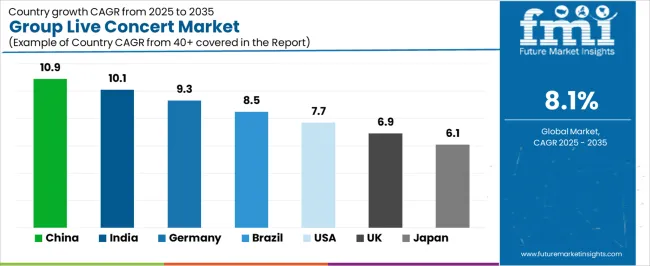
| Country | CAGR (%) |
|---|---|
| China | 10.9% |
| India | 10.1% |
| Germany | 9.3% |
| Brazil | 8.5% |
| USA | 7.7% |
| UK | 6.9% |
| Japan | 6.1% |
The group live concert market is growing across key countries, with China leading at a 10.9% CAGR. This growth is driven by the country’s booming entertainment industry, increased disposable income, and a growing appetite for live music events. India follows closely at 10.1%, supported by a vibrant music culture and the rising popularity of live performances. Germany is growing at 9.3%, fueled by its strong live music scene and high demand for concerts across various genres. Brazil shows an 8.5% CAGR, driven by the country's love for music and entertainment. The USA, UK, and Japan experience moderate growth at 7.7%, 6.9%, and 6.1%, respectively, as live concerts remain an essential part of the entertainment landscape.
China is leading the group live concert market with a 10.9% CAGR, driven by the rapid growth of the country’s entertainment and live performance industry. As China’s middle class expands and disposable income rises, there is a growing appetite for live music events, ranging from international tours to local performances. The increased presence of global artists, combined with a strong domestic music scene, has led to a rise in demand for large-scale concerts.
The country’s digital transformation and the increasing popularity of online ticket sales and live streaming are also fueling the growth of the live concert market. Younger generations, particularly in urban areas, are embracing live performances as a key part of their entertainment culture. The rise of festival culture in China, with music festivals becoming more mainstream, is further driving the demand for group live concerts. As more cities host major music events and concerts, China is expected to maintain strong growth in the live concert market.
India is experiencing robust growth in the group live concert market, with a 10.1% CAGR. The country’s vibrant music culture, coupled with the growing interest in international and regional live performances, is a key factor driving this market’s expansion. As India’s middle class grows and disposable income increases, more consumers are willing to spend on live entertainment, including concerts. The country’s diverse music scene, encompassing classical, Bollywood, rock, and electronic music, ensures that there is something for every type of concertgoer.
India’s younger demographic, particularly millennials and Gen Z, are increasingly engaged in live music events. Music festivals, concerts, and international tours have become an integral part of India’s entertainment landscape. The rise of mobile ticketing platforms and digital marketing has made it easier for concert organizers to reach a larger audience, contributing to the growth of the market. As the demand for both domestic and international performances grows, India’s group live concert market is expected to continue thriving.
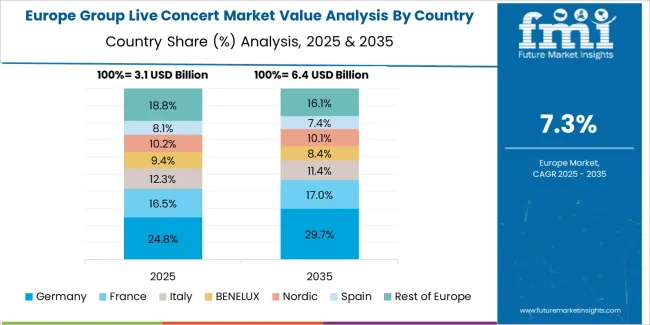
Germany is witnessing steady growth in the group live concert market, with a 9.3% CAGR. The country is known for its rich music culture, which spans classical, electronic, rock, and jazz, among other genres. Germany’s established music scene, with iconic venues such as the Berlin Philharmonie and the Rock am Ring festival, contributes significantly to the demand for live performances. As live music remains a crucial part of the entertainment industry, the country continues to draw large crowds for both international and domestic artists.
The increasing number of music festivals, ranging from classical to contemporary music, is also driving growth. As Germany remains a hub for major European music festivals, the demand for live concerts has been steadily rising. The country’s strong economy and high standard of living enable more people to attend concerts, making live music a popular form of entertainment. As international artists continue to tour Germany and local artists gain popularity, the market for group live concerts is expected to grow steadily.
Brazil is experiencing steady growth in the group live concert market with an 8.5% CAGR. The country’s deep cultural roots in music, from samba to bossa nova, and its vibrant festival scene contribute to a growing demand for live music performances. Brazil’s diverse music scene, combined with an increasing number of music festivals, drives the popularity of group live concerts, particularly among younger audiences. As more international and regional artists tour the country, there is a surge in concert-goers eager to experience live performances.
The increasing disposable income in Brazil, particularly in urban areas, is also fueling the growth of the live concert market. Music festivals such as Rock in Rio and Lollapalooza Brazil are major drivers of live concert demand, attracting thousands of attendees annually. Brazil’s growing tourism industry, which often centers around music festivals and concerts, contributes to the steady rise in market growth. As the country continues to embrace live music culture, the demand for group live concerts is expected to expand.
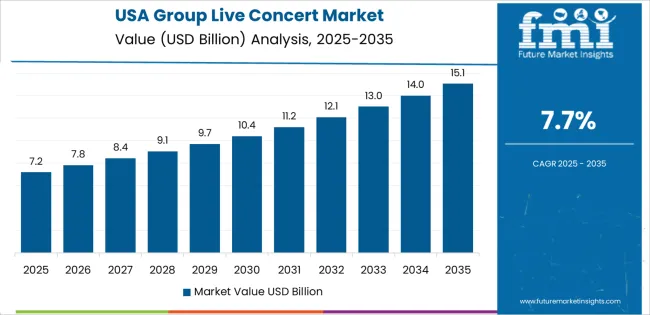
The USA is experiencing steady growth in the group live concert market, with a 7.7% CAGR. As one of the largest entertainment markets in the world, the USA has a deep-rooted culture of live music, with major cities such as New York, Los Angeles, and Nashville known for their iconic music venues and concert halls. The country’s diverse music scene, from rock to hip-hop, electronic to jazz, ensures that live performances continue to attract large audiences. Concerts and music festivals remain a key part of the American entertainment landscape.
The increasing popularity of large-scale festivals like Coachella, Electric Daisy Carnival, and Lollapalooza, along with the constant touring of global and local artists, helps drive the market. As digital ticketing and streaming platforms make it easier for people to access information about live events, attendance rates continue to rise. With growing disposable incomes and the rising cultural significance of live events, the USA's group live concert market is expected to see continued growth.
The UK is witnessing moderate growth in the group live concert market with a 6.9% CAGR. The country’s rich music history, from The Beatles to modern-day artists, has helped establish a thriving live concert scene. Iconic venues like The O2 Arena in London and festivals such as Glastonbury continue to attract large audiences, driving the demand for live music experiences. The UK’s strong live music culture, spanning a variety of genres, ensures that concerts remain a vital part of the entertainment landscape.
The increasing popularity of music festivals and the rise of immersive live experiences are key factors contributing to market growth. As the UK embraces more live streaming options and mobile ticketing, it has become easier for consumers to engage with concerts and festivals. With rising consumer spending on entertainment, particularly among younger generations, the group live concert market in the UK is set to continue expanding.
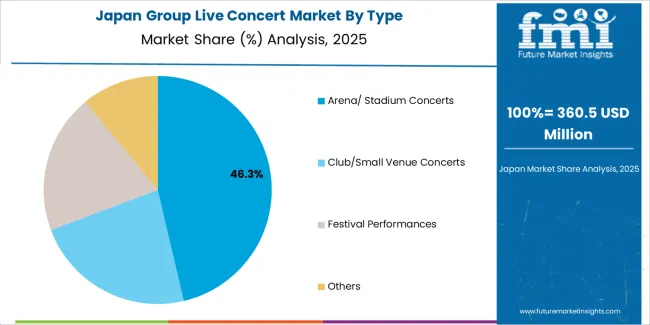
Japan’s group live concert market is growing steadily with a 6.1% CAGR. The country’s deep connection to music, particularly in pop, rock, and electronic genres, has driven the demand for live performances. Tokyo and Osaka are home to a large number of music venues, attracting both international and local artists. Japanese music fans are known for their enthusiasm and loyalty to live concerts, which continues to drive the demand for group performances. The rise of J-pop and international music festivals has further fueled the market.
The growing disposable income and the popularity of concert tourism in Japan contribute to the rise in demand for live music events. With an increasing number of music festivals and international artists touring Japan, live concert attendance continues to rise. The country’s strong focus on digital ticketing and live-streaming platforms has also made it easier for fans to access concerts, contributing to the market’s steady growth. As Japan’s live music culture continues to thrive, the demand for group live concerts will likely remain strong.
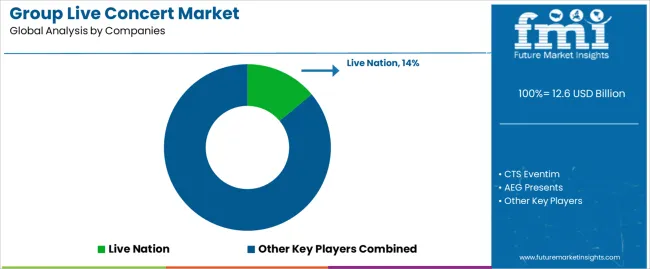
The group live concert market is a dynamic segment of the entertainment industry, driven by the growing demand for live music experiences, festivals, and large-scale concerts. Live Nation leads the market with a 14% share, recognized as one of the largest global event promoters and ticketing platforms. Live Nation’s extensive portfolio of concerts, music festivals, and its deep relationships with major artists and venues help it maintain a dominant position in the market.
Other key players in the market include CTS Eventim, AEG Presents, and Superstruct, which are major competitors in the live event promotion and ticketing sectors. CTS Eventim is a leading European live entertainment company, specializing in ticketing, promoting concerts, and organizing large-scale live events. AEG Presents is a global leader in live entertainment and concert promotion, with a vast network of venues and partnerships with major artists. Superstruct focuses on large-scale events and music festivals, expanding its influence across Europe and North America.
Companies such as DEAG, LDH Japan, and SM are important regional players. DEAG is a major concert promoter in Germany and Europe, known for its extensive range of live events and music festivals. LDH Japan, SM, HORIPRO, JYP, and YG are influential players in the Asian live concert market, particularly in the K-pop and J-pop sectors, organizing concerts and festivals for some of the most popular artists in Asia.
| Items | Values |
|---|---|
| Quantitative Units (2025) | USD billion |
| Type | Arena/Stadium Concerts, Club/Small Venue Concerts, Festival Performances, Others |
| Application | Entertainment Industry, Public Welfare Industry |
| Regions Covered | Asia Pacific, Europe, North America, Latin America, Middle East & Africa |
| Countries Covered | China, Japan, South Korea, India, Australia & New Zealand, ASEAN, Rest of Asia Pacific, Germany, United Kingdom, France, Italy, Spain, Nordic, BENELUX, Rest of Europe, United States, Canada, Mexico, Brazil, Chile, Rest of Latin America, Kingdom of Saudi Arabia, Other GCC Countries, Turkey, South Africa, Other African Union, Rest of Middle East & Africa |
| Key Companies Profiled | Live Nation, CTS Eventim, AEG Presents, Superstruct, DEAG, LDH Japan, SM Entertainment, HORIPRO, JYP Entertainment, YG Entertainment |
| Additional Attributes | Dollar sales by type and application categories, market growth trends, market adoption by classification and application segments, regional adoption trends, competitive landscape, advancements in live concert technologies, integration with entertainment industry events and public welfare initiatives. |
The global group live concert market is estimated to be valued at USD 12.6 billion in 2025.
The market size for the group live concert market is projected to reach USD 27.5 billion by 2035.
The group live concert market is expected to grow at a 8.1% CAGR between 2025 and 2035.
The key product types in group live concert market are arena/ stadium concerts, club/small venue concerts, festival performances and others.
In terms of application, entertainment industry segment to command 70.0% share in the group live concert market in 2025.






Our Research Products

The "Full Research Suite" delivers actionable market intel, deep dives on markets or technologies, so clients act faster, cut risk, and unlock growth.

The Leaderboard benchmarks and ranks top vendors, classifying them as Established Leaders, Leading Challengers, or Disruptors & Challengers.

Locates where complements amplify value and substitutes erode it, forecasting net impact by horizon

We deliver granular, decision-grade intel: market sizing, 5-year forecasts, pricing, adoption, usage, revenue, and operational KPIs—plus competitor tracking, regulation, and value chains—across 60 countries broadly.

Spot the shifts before they hit your P&L. We track inflection points, adoption curves, pricing moves, and ecosystem plays to show where demand is heading, why it is changing, and what to do next across high-growth markets and disruptive tech

Real-time reads of user behavior. We track shifting priorities, perceptions of today’s and next-gen services, and provider experience, then pace how fast tech moves from trial to adoption, blending buyer, consumer, and channel inputs with social signals (#WhySwitch, #UX).

Partner with our analyst team to build a custom report designed around your business priorities. From analysing market trends to assessing competitors or crafting bespoke datasets, we tailor insights to your needs.
Supplier Intelligence
Discovery & Profiling
Capacity & Footprint
Performance & Risk
Compliance & Governance
Commercial Readiness
Who Supplies Whom
Scorecards & Shortlists
Playbooks & Docs
Category Intelligence
Definition & Scope
Demand & Use Cases
Cost Drivers
Market Structure
Supply Chain Map
Trade & Policy
Operating Norms
Deliverables
Buyer Intelligence
Account Basics
Spend & Scope
Procurement Model
Vendor Requirements
Terms & Policies
Entry Strategy
Pain Points & Triggers
Outputs
Pricing Analysis
Benchmarks
Trends
Should-Cost
Indexation
Landed Cost
Commercial Terms
Deliverables
Brand Analysis
Positioning & Value Prop
Share & Presence
Customer Evidence
Go-to-Market
Digital & Reputation
Compliance & Trust
KPIs & Gaps
Outputs
Full Research Suite comprises of:
Market outlook & trends analysis
Interviews & case studies
Strategic recommendations
Vendor profiles & capabilities analysis
5-year forecasts
8 regions and 60+ country-level data splits
Market segment data splits
12 months of continuous data updates
DELIVERED AS:
PDF EXCEL ONLINE
Group Dining Intelligent Platform Market Size and Share Forecast Outlook 2025 to 2035
Digital Group Dining Service Market Size and Share Forecast Outlook 2025 to 2035
Global Clinical Risk Grouping Solution Market Insights – Trends & Forecast 2024-2034
Vascular Sheath Group Market Size and Share Forecast Outlook 2025 to 2035
Chalcocite-Digenite Group Market Size and Share Forecast Outlook 2025 to 2035
Liver Disease Diagnostics Market Size and Share Forecast Outlook 2025 to 2035
Liver Cancer Diagnostics Market Size and Share Forecast Outlook 2025 to 2035
Live Seafood Market Size and Share Forecast Outlook 2025 to 2035
Livestock Panel Gates Market Size and Share Forecast Outlook 2025 to 2035
Livestock Trailer Market Size and Share Forecast Outlook 2025 to 2035
Live Cell RNA Detection Market Size and Share Forecast Outlook 2025 to 2035
Liver Health Supplements Market Analysis - Size, Growth, and Forecast 2025 to 2035
The Liver Transplantation Market is segmented by Treatment type and End User from 2025 to 2035
Live Cell Encapsulation Market Analysis & Forecast for 2025 to 2035
Liver Fibrosis Treatment Market - Innovations & Future Trends 2025 to 2035
Global Live Stock Vaccine Market Analysis – Size, Share & Forecast 2024-2034
Liver Fluke Treatment Market
Live Vaccines Market
Livestock Monitoring System Market
Olive Market Size and Share Forecast Outlook 2025 to 2035

Thank you!
You will receive an email from our Business Development Manager. Please be sure to check your SPAM/JUNK folder too.
Chat With
MaRIA